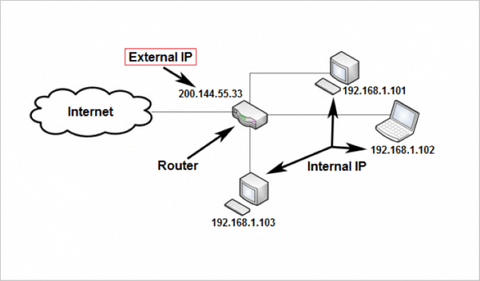How To Get My Ip Address
You've heard about it before: an unknown online assailant has been inundating someone in your town with bothersome messages.
Luckily, even though that person's profile may be devoid of identifying information, the authorities can track them down with something called an IP address. The same goes for pirated downloads, illegal pornography, or selling nefarious goods online—all of that activity can be traced back to you through your IP address.
💻Want best-in-class explainers about the digital world? We'll be your tech support.
But what is an IP address? And what if I'm using a VPN or incognito mode on my browser? To understand these macro questions, it's necessary to first drill into the micro technical specs. So, let's start at the very beginning.
What Is an IP Address?
Put simply, an IP address (short for Internet Protocol address) is a unique identifier for your machine. Computers have them, but so do tablets and smartphones. And, just like a fingerprint or a snowflake, no two IP addresses are exactly the same.

Wikipedia
There are standards for these sorts of things, of course, and the Internet Assigned Numbers (IANA) Authority sets them. There are two primary types of IP addresses in use today: IP version 4 (IPv4) and IP version 6 (IPv6). The former has been around since January 1983, and is still the most common. These are 32-bit numbers expressed in four octets, separated in a so-called "dotted decimal" notation—for example, 192.0.2.53.
By 1999, with the commercialization of internet access well underway, experts were concerned that the IANA could actually run out of valid IPv4 addresses. So, the Internet Engineering Task Force, a nonprofit standards organization based in Fremont, California, engineered its successor, IPv6. These are 128-bit numbers, expressed in hexadecimal strings—for instance, 2001:0db8:582:ae33::29.
Equally important is what an IP address is not. There are some misleading analogies out there, but the most common one is a comparison to your home address. That is flat-out inaccurate considering your home address is a very specific and static location, while IP addresses are often more of an estimate of your location.
In a 2016 white paper on the use of IP addresses in criminal investigations, the Electronic Frontier Foundation points out that such metaphors "incorrectly characterize the function and reliability of IP addresses, and they potentially operate to overstate the accuracy of IP address information."

Screenshot/IANA
When the IANA set up the IPv4 and then IPv6 protocols, the designers created the system to uniquely identify an electronic destination on the internet—not an exact physical one. The IANA created blocks of IP addresses, assigning them to regions throughout the world on a numeric basis, not a geographical one. For instance, IP addresses in India and Australia fall under the same registry, despite their disparate geographical locations. Beyond the regional level, internet service providers usually assign IP addresses to customers, which introduces even more variation.
Internal vs. External IP Address

TroyPoint
Your external IP address is what you likely think about first when considering that unique string of numbers associated with your internet use. It's also the IP address that your internet service provider assigns to you, and it's all public. Put another way: it's the digital address for your router interface.
From there, your router provides your devices with internet access. At this point, when you visit a website on your phone or laptop, each of those devices has its own internal IP address—also called a private IP address—that is logged along with your browsing history.
Think of the relationship between the two like a phone extension. Your telephone provider assigns you a particular phone number that routes calls only to you. This would be the internal IP address. But the default company number, which is publicly listed, is like your external IP address. In this analogy, your router acts as a kind of receptionist.
What's a VPN?
In that receptionist scenario, everyone can find the company's phone number—the external IP address in this case. That said, if you want to keep your external IP address private, you should consider installing a virtual private network (VPN), which masks your external IP address by issuing you a new one that is not tied to your internet service provider.
Why would you want to do that? Beyond the urge to stream shows that are only available in other countries, there's a practical application in the workplace. Now that most of us are working from home, employers will often provide workers with a corporate VPN to give them secure access to the company's internal network and data, for instance.
How To Get Your IP Address
Regardless of the device and software that you're using, you should navigate to your WiFi or Ethernet settings to find your IP address. Here's a list of how to do that on four separate kinds of devices, but if you don't see your specific make and model, digging into your internet settings should get you there.
There's also a pretty cool Google shortcut. Just click this link and Google will display your IP address at the top of the search results page. Otherwise...
- On a Mac: Apple menu > System Preferences > Network > Select either WiFi or Ethernet, depending on your connection > your IP address is displayed in the open window, right beneath the status of your connection.
- On a PC running Windows 10: On the task bar, select WiFi or Ethernet > click on the network you're currently connected to > select Properties > your IP address is listed next to " IPv4 address."
- On an Android smartphone or tablet: Settings > Wireless & Networks (or "Network & Internet" on Pixel devices) > select the WiFi network that you're connected to > Your IP address is displayed alongside other network information.
- On an iPhone/iPad: Settings > WiFi > tap the arrow next to your network name > your IP address is displayed to the right of "IP address."
🎥 Now Watch This:
Courtney Linder Senior Editor Before joining Pop Mech, Courtney was the technology reporter at her hometown newspaper, the Pittsburgh Post-Gazette.
This content is created and maintained by a third party, and imported onto this page to help users provide their email addresses. You may be able to find more information about this and similar content at piano.io
How To Get My Ip Address
Source: https://www.popularmechanics.com/technology/a32729384/how-to-find-ip-address/
Posted by: cookewinger91.blogspot.com

0 Response to "How To Get My Ip Address"
Post a Comment